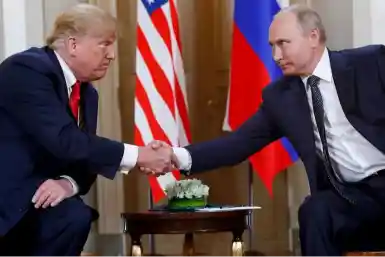U.S. President Donald Trump has announced that he will meet Russian President Vladimir Putin next Friday, August 15, 2025, in Alaska for talks aimed at ending the war in Ukraine.
In a post on Truth Social, Trump wrote, “The highly anticipated meeting between myself, as President of the United States of America, and President Vladimir Putin of Russia will take place next Friday, August 15, 2025, in the Great State of Alaska. Further details to follow. Thank you for your attention to this matter!”
The Kremlin confirmed the date, with Putin’s aide Yury Ushakov stating that both leaders would focus on discussing options for achieving a long-term peaceful resolution to the Ukrainian crisis. Ushakov described the process as challenging but emphasized that Moscow would engage “actively and energetically.”

This will be Putin’s first visit to the United States since his meeting with then-President Barack Obama in 2015 at the UN General Assembly in New York.
Speaking during the signing of the Armenia-Azerbaijan peace accord at the White House, Trump suggested that a peace deal in Ukraine could involve territorial exchanges. “We’re going to get some back, and we’re going to get some switched. There’ll be some swapping of territories to the betterment of both, but we’ll be talking about that either later or tomorrow,” he said.
Pressed on progress, Trump expressed optimism. “We are getting very close to a deal. Working with European nations, who are terrific people and leaders, is a pleasure through NATO… In all fairness to President Zelensky, he is getting everything he needs, assuming we will get something done. I will be meeting very shortly with President Putin. It would have been sooner, but I guess there are security arrangements that unfortunately people have to make.”
However, Ukraine remains firm. President Volodymyr Zelensky’s government is constitutionally barred from ceding any territory and has repeatedly stated it will not surrender land, including Crimea—annexed by Russia in 2014—and four regions claimed by Moscow in 2022.
The conflict, now in its fourth year, has killed tens of thousands and displaced millions. Despite repeated calls from the United States, Europe, and Ukraine for a ceasefire, Russian forces continue their offensive. Three direct rounds of talks between Moscow and Kyiv have so far failed to yield progress.
Trump’s special envoy, Steve Witkoff, met Putin in Moscow this week for three hours of discussions described by the U.S. side as “highly productive.” Witkoff had suggested a three-way meeting including Zelensky, but the Russian side reportedly declined to comment on this proposal.
Since returning to office in January, Trump’s stance on Russia has fluctuated between praise and criticism. He has threatened new sanctions on Moscow and countries buying Russian oil unless Russia agrees to halt its military offensive. On Wednesday, the U.S. imposed an additional 25% tariff on Indian goods in response to India’s continued imports of Russian oil—marking the first direct financial penalty on a Russian oil customer during Trump’s second term.
Any agreement will need to address more than just territory. Kyiv demands security guarantees from NATO or Western powers to prevent future Russian attacks. Putin has called for limits on Western arms shipments to Ukraine and political changes in Kyiv, including elections in which Moscow could exert influence.
For now, both sides remain entrenched. Whether the Alaska summit marks the start of genuine progress or another round of stalled diplomacy will become clear in the coming days.
